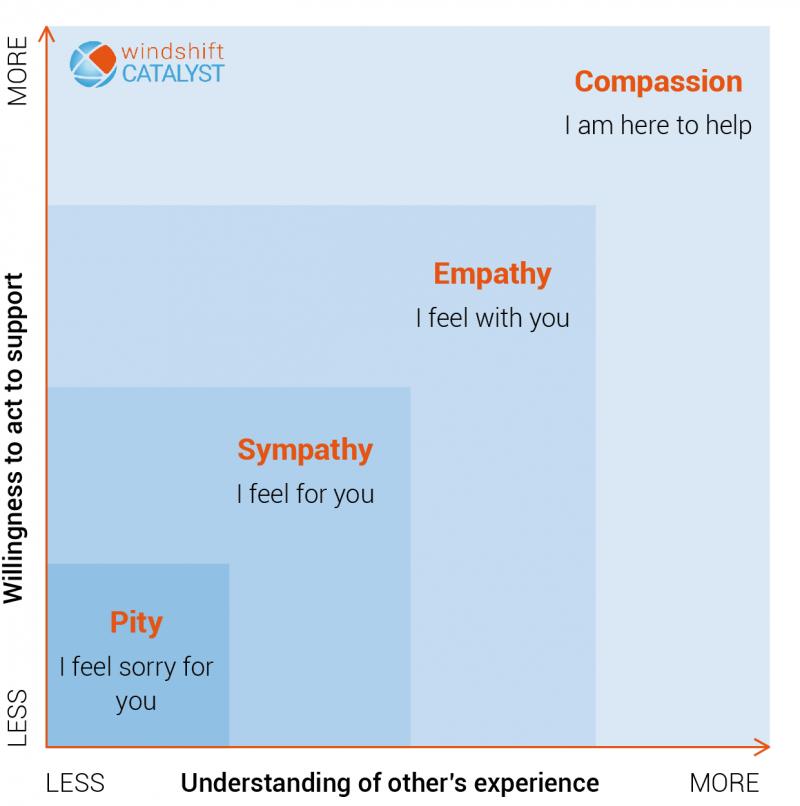Remember when I discussed empathy and how to develop your empathy further? Then you also know what empathic action is, or the action we can link to someone else's emotion. Today, we pick up where we left off, but in the form of compassion. The title shows how managers can best use these concepts, but how do empathy and compassion differ? And what steps do you take to lead with compassion?
What is compassion?
Compassion is acting for the benefit of another. It may sound a bit clinical, but it is certainly not meant that way. When we approach a problem with compassion, we distance ourselves from empathy and ask ourselves how to support someone struggling.
According to Thupten Jinpa, one of the Dalai Lama's translators, compassion consists of three elements:
- Cognition: "I understand your situation; I know the facts."
- Emotion: "I understand how you feel in this situation."
- Motivation: "You don't do it alone; together, we solve it!"
What is the difference between empathy and compassion?
Neurological research shows that empathy and compassion appeal to two different brain areas. Empathy is the ability to recognize and sympathize with the feelings of others, while compassion focuses on the action to change these feelings.
If you translate this to an organization, you can imagine that leading from empathy is almost impossible. Paul Polman, former CEO of Unilever, put it very aptly: "If I had led with empathy, I would never have come to a decision. Why? Because then I would have felt all the emotions of others, which would have made it impossible to keep seeing the big picture. You have to have the human side of empathy, but you have to run a company with compassion."
Empathy creates rapport and builds trust in the workplace, creating a foundation for a strong team. With compassion, you can objectively assess the team's behaviour for the greater good and help each team member overcome their obstacles.

5 Ways to Lead with Compassion
It is good for every leader to be alert to their way of leading. Are you avoiding an empathetic leadership role in this? Then, this certainly does not mean that you are unkind. You only support people better if you lead with compassion. Read below how you can put this into practice yourself.
Distance yourself mentally and emotionally
Avoid going along with someone else's grief and take a mental and emotional step back. In this way, you distance yourself and see clearly what it is about and what the problem is. Remember that you are not distancing yourself from the person but only from the problem. This way, you help with the solution and are certainly not unkind.
Ask where the needs lie
When someone is suffering, in whatever form, the most important thing is that they feel seen and heard. And what better way to do this than asking where the needs lie? In this way, you immediately set the solution process in motion, so to speak, in a cliché:win-win.
>Also interesting: Soft skills don't exist: Human skills do
Remember the power of doing nothing
As a manager, you are used to getting things done. However, it is more important to offer a listening ear rather than immediately coming up with a solution to personal challenges. Listen, acknowledge the problem, and know this is already an important part of the solution.
Guide someone to their own solution
Leadership does not focus on solving other people's problems but on helping others grow so that they solve their problems. So, lead them to solutions, but make sure they determine them themselves.
Practice self-compassion
Do you want to lead with compassion? Actively practice self-compassion and avoid sacrificing other people's problems. Work has a big emotional side, and being preoccupied with other people's problems. A few examples of self-compassion? Take (breathing) breaks, sleep and eat well, invest in your relationships and be mindful. By being well-balanced with yourself, you are also a strong leader that others can lean on.
Conclusion
By using empathy and compassion in the right ways as a leader, we help ourselves, our colleagues, and the organization. Because everyone who feels heard and seen actively contributes to a healthy company culture, even if this means that the manager does not feel their sadness.
Are you curious how teambuilding can help you become a better leader? Please feel free to contact us to discuss the possibilities together with compassion.





